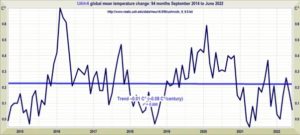by J. MCEVOY, Jul 1, 202 in CimateChangeDispatch
World leaders at the G7 summit in Germany signaled they will turn back to fossil fuels despite their commitments to a green energy transition thanks to the ongoing energy crisis.
The war in Ukraine is heavily restricting fuel imports, with Russia cutting off European access to the Nord Stream pipeline and the US imposing a fuel embargo on Putin. [bold, links added]
As a result, the U.S. and European countries are abandoning their climate agenda to return to fossil fuels.
Amid skyrocketing fuel prices, the Biden administration has been forced to abandon certain planks of its climate agenda.
Biden called for a temporary increase in domestic fuel production two weeks ago and also asked Congress to suspend the federal per-gallon gas tax for three months last week.
“The G7 leaders are pretending that nothing has happened to the green agenda,” Benny Peiser, director of the Global Warming Policy Forum, told The Daily Caller News Foundation. “In reality, if you look at individual member states… it’s quite obvious that the green agenda will be sunk.”
…
by C. Monckton of Brenchley, July 2, 2022 in WUWT
The New Pause paused last month because I was ill. Many apologies for the interruption. Now, however, it resumes – and it has lengthened from 7 years 7 months to the end of April 2022. To the end of June 2022, the New Pause is now 7 years 10 months in length:

This Pause, like its predecessor, which was an impressive 18 years 8 months (UAH), or 18 years 9 months (HadCRUT4), is, as always, not cherry-picked. It is derived from the UAH monthly global mean lower-troposphere temperature anomalies as the period from the earliest month starting with which the least-squares linear-regression trend to the most recent month for which data are available does not exceed zero. Whatever the data show, I show. Or, in the immortal words of Dr Roy Spencer, speaking of his dataset, “It is what it is”. In that splendid dictum speaks all true science.
The least-squares trend, which Professor Jones at the University of East Anglia used to recommend as the simplest and most robust method of deriving global-temperature trends, takes due account of all monthly values, not merely of the starting and ending values.
…
See also here
La géologie, une science plus que passionnante … et diverse

